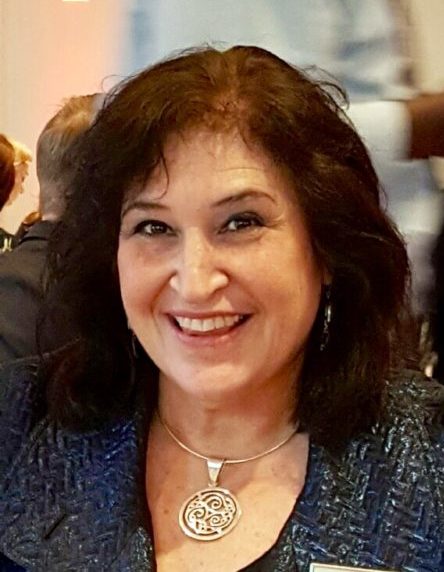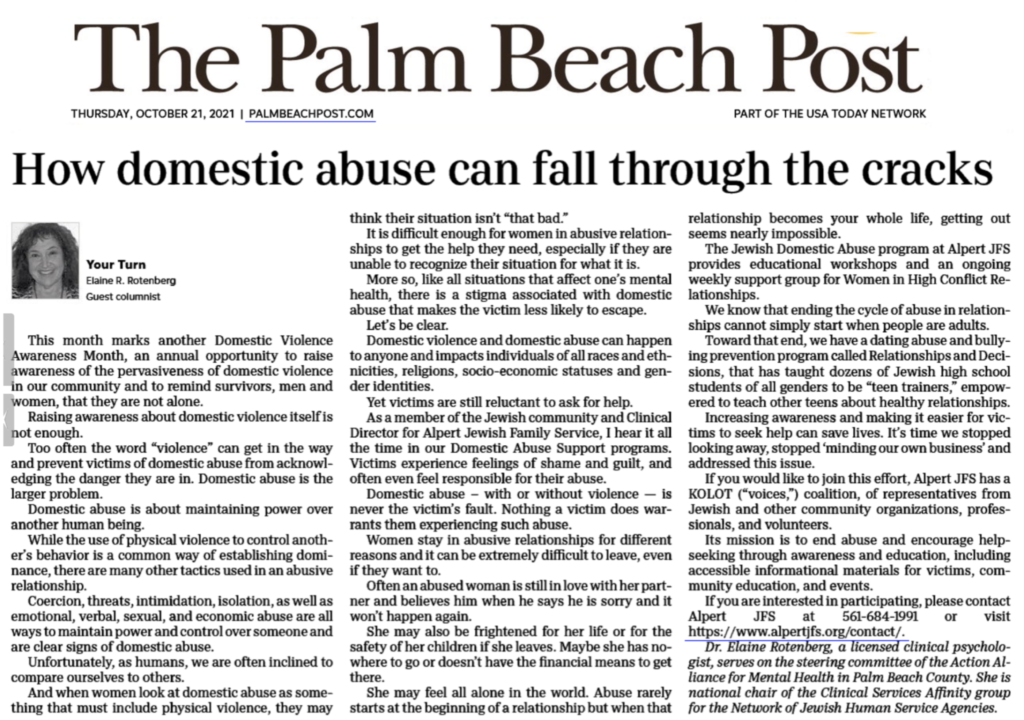How domestic abuse can fall through the cracks


This October marks another Domestic Violence Awareness Month, an annual opportunity to raise awareness of the pervasiveness of domestic violence in our community and to remind survivors that they are not alone. Launched in 1987, over the past 30+ years, much progress has been made to support domestic violence victims and survivors, to hold perpetrators accountable, and to create and update legislation to further those goals. However, raising awareness about domestic violence itself is not enough. Too often, the word “violence” can get in the way. Domestic abuse is the larger problem. Unfortunately, focusing on the aspect of physical violence may prevent victims of domestic abuse from seeking help, or from acknowledging the extremely dangerous situation they are actually in.
Domestic abuse is about maintaining power over another human being. While the use of physical violence to control another’s behavior is a common way of establishing dominance, there are many other tactics used in an abusive relationship. Coercion, threats, intimidation, isolation, as well as emotional, verbal, sexual, and economic abuse are all ways to maintain power and control over someone and are clear signs of domestic abuse.
Unfortunately, as humans, we are often inclined to compare ourselves to others. And when women look at domestic abuse as something that must include physical violence, they may think their situation isn’t “that bad”. It is difficult enough for women in abusive relationships to get the help they need, especially if they are unable to recognize their situation for what it is. More so, like all situations that affect one’s mental health, there is a stigma associated with domestic abuse that makes victim less likely to escape.
Let’s be clear. Domestic violence and domestic abuse can happen to anyone at any time and impacts individuals of all races and ethnicities, religions, socio-economic statuses, and gender identities. Yet victims are still reluctant to ask for help. As a member of the Jewish community and Clinical Director for Alpert JFS, I hear it all the time in our Domestic Abuse Support programs. Victims experience feelings of shame and guilt, and often even feel responsible for their abuse.
Look at the most recent example of what should have raised red flags about an extremely dangerous situation: Gabby Petito. The horrific murder case became even more devastating after police released body cam footage of Petito and her fiancé, Brian Laundrie, during a police stop weeks before she went missing. The footage shows an officer asking Petito whether she had been hit by Laundrie, and although a distraught Petito confirms that he injured her, she immediately took the blame for the incident, telling police she hit him first. The importance that is placed on whether physical violence occurred aside, the fact that Gabby chose to take the blame for the situation is a telltale sign of domestic abuse. Whether the altercation turned violent or remained an animated argument is irrelevant. The abuse is clearly there, regardless of an escalation to physical violence.
This is why it is so important to widely educate our community that domestic abuse – with or without violence – is never the victim’s fault. Nothing a victim does warrants them experiencing such abuse. For more than 25 years, Alpert JFS has worked to shine a light on this issue and these efforts continue to gain importance. Part of the Alpert JFS mission is to address abuse in Jewish households. This is relevant because SHALOM BAYIT (Peace in the Home) is an important foundation in Jewish families, and some Jewish women tend to shoulder abuse in order to keep peace in the home. However, Jewish religious leaders all agree that when shalom is shattered by abuse, a woman has the responsibility to speak up. Where domestic abuse is involved, Shalom Bayit does not mean that a woman deny herself safety through silence.
Women stay in abusive relationships for different reasons, and it can be extremely difficult to leave, even if they really want to. Like any other relationship, one that ends in abuse began with falling in love. Often abused women are still in love with their partner and believe him when he says he is sorry and it won’t happen again. She may also be frightened for her life or for the safety of her children if she leaves. Maybe she has nowhere to go or doesn’t have the financial means to get there. Isolation is common in abusive relationships, so she may feel all alone in the world. Abuse rarely starts at the beginning of a relationship, but when that relationship becomes your whole life, getting out seems nearly impossible.
The Jewish Domestic Abuse program at Alpert JFS provides educational workshops and an ongoing weekly support group for Women in High Conflict Relationships. We know that ending the cycle of abuse in relationships cannot simply start when people are adults. Toward that end, we have a dating abuse and bullying prevention program called Relationships and Decisions, that has taught dozens of Jewish high school students to be “teen trainers” empowered to teach other teens about healthy relationships. But we need help to increase awareness, that is why I am speaking out.
Yes, abuse happens to men as well as women. However, the number of women who experience intimate partner abuse is twice that of men. Unfortunately, it often takes someone 6 or 7 times before victims find their ways to safety, IF they do. Unfortunately, in Gabby Petito’s case, it was too late. Her cause of death was recently reported as manual strangulation.
No more.
Increasing awareness and making it easier for victims to seek help can save lives. It’s time we stop looking away, stop ‘minding our own business,’ and address this issue head-on. The problem is real, and it can be deadly.
If you would like to join this effort, Alpert JFS has a KOLOT (“voices,”) coalition, of representatives from Jewish and other community organizations, professionals, and volunteers. Its mission is to end abuse and encourage help-seeking through awareness and education, including accessible informational materials for victims, community education, and events. If you are interested in participating, please contact Alpert JFS at 561-684-1991 or visit https://www.alpertjfs.org/contact/.
Dr. Elaine Rotenberg is a licensed clinical psychologist, a member of the American Psychological Association, and the Florida Psychological Association, and serves on the steering committee of the Action Alliance for Mental Health in Palm Beach County. She is the national chair of the Clinical Services Affinity group for the Network of Jewish Human Service Agencies, and a member of the Best Practices Steering Committee.
Leave a Reply